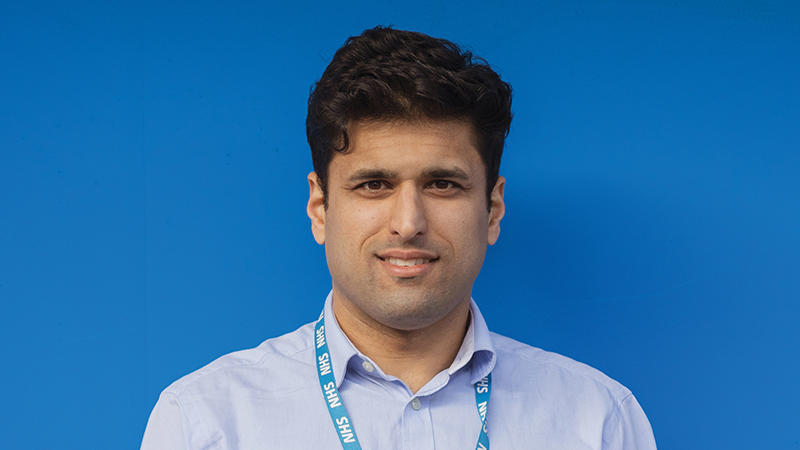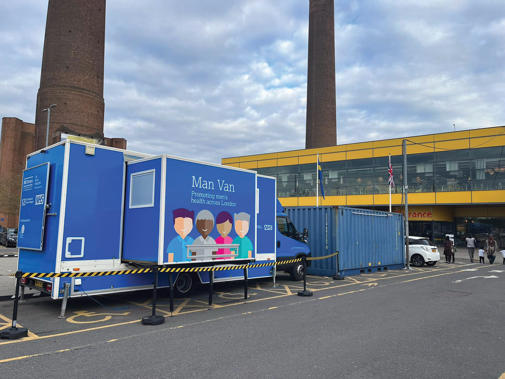Outside a church congregation, on a construction site, in the car park of Croydon IKEA… they’re not locations you’d typically associate with delivering healthcare.
Yet that’s exactly where patients have found a mobile outreach clinic aiming to speed-up prostate cancer diagnosis and provide better outcomes for Black men who are twice as likely as others to get prostate cancer, which leads to more than 12,000 deaths a year in the UK.
The Man Van, an initiative developed by The Royal Marsden NHS Foundation Trust, The Institute of Cancer Research, and RM Partners West London Cancer Alliance, is in the second stage of a pilot – funded by NHS England – testing as many south London men over the age of 45 as possible.
Doctors behind the initiative hope it can become a cost-effective model for early intervention and targeted care, not only in the most common male cancer – but to help detect cardiovascular and psychological risks or signs of diabetes and liver disease.
The van has also been parked at a community centre in Sutton, outside Croydon University Hospital, near a recycling centre and by GP practices. Locations being considered include at a football stadium and shopping centres.
Lots of organisations are raising awareness, this is about increasing accessDr Moghul
Nick James, a professor of prostate and bladder cancer research at The Institute of Cancer Research, London, and consultant clinical oncologist at The Royal Marsden, came up with the concept before COVID, when he was working in Birmingham.
He says the initial idea was to go to people’s places of work but found ‘the demographics weren’t right’ because ‘people don’t necessarily live where they work’.
The 20-minute appointments are booked in advance through GP practices, which send texts to targeted patients on behalf of the mobile clinic.
‘If you can get to people, it’s easier for them to access your service,’ says Masood Moghul, a clinical research fellow funded by The Royal Marsden Cancer Charity who runs the service.
‘It has been a bit of trial and error. Ideally, we want places with good access, and parking. We do a lot of groundwork to find locations. Lots of organisations are raising awareness, this is about increasing access.’
Good feedback
A walk-in service was considered but ‘doesn’t quite work’, says Dr Moghul. ‘It’s not like a blood pressure or diabetic check. Because we’re dealing with potential cancers, you need a bit of privacy.’
Results of Prostate-Specific Antigen (PSA) tests are typically given two to three days after an appointment, usually over the phone. Referrals are often made to The Royal Marsden, and can be with the same team at the van, offering patients continuity. Polygenic risk scores telling patients their likelihood of getting prostate cancer in the future can also be offered.
It is hoped the Man Van may take some pressure off general practice. Prof James says the current route to getting a PSA test involves ‘three or four visits’, noting: ‘If you’re on a zero-hours contract, taking time off to go to the doctors means you’re leaving behind money.’
Dr Moghul agrees men ‘have to be quite committed’ to get a PSA test via a GP appointment, cooling off period and returning for blood tests. By contrast, patients ‘have control’ of when and where they visit the Man Van.
 MOGHUL: Service has a good relationship with GPs
MOGHUL: Service has a good relationship with GPs
‘Feedback from GPs [in the pilot area] has been really positive,’ he says. ’We see ourselves as a helping hand. We’re finding problems that are already there, not creating problems.’
The service, continually evolving in its pilot, looks for red flags such as weight loss or lumps and feeds those back to GPs – which can help lead to earlier interventions and better outcomes.
Dr Moghul explains: ‘You’re putting in the same amount of effort to find people, so it’s about how much time they’re spending with you. If they’re spending five to ten minutes doing urological tests, adding another five to ten minutes doesn’t add much in terms of cost – but could potentially add a lot in terms of value.’
Prof James notes ‘the pick-up rates are staggering’. Pilot results show 28 per cent of those tested have hypertension, 5.4 per cent have diabetes and a further 15.6 per cent have pre-diabetes states. The pilot has also started looking at liver function and using mental health questionnaires. At the end of the pilot, results from embedded studies looking at health economics, genetics and why people chose to turn up will be collated.
‘We’re very interested in how cost-effective it is if you test for other things as well,’ says Prof James. ‘We’ll be seeing whether knowledge of your future, knowing of conditions you haven’t got yet but are at high risk of getting, modifies people’s behaviour. The question is “if you are obese but not diabetic, and told you’ve got a 90% chance of developing diabetes in the next 10 years, do you go on a diet or not?”. We are going to get all sorts of interesting data back.’
Targeted testing
A big part of the pilot is using its results to improve prostate cancer outcomes for ethnic minority men. Pilot results include data from a high proportion of groups that are often underrepresented in clinical trials. For instance, 29 per cent of the men are Black/Black British, higher than the 15 per cent Black ethnicity in Croydon. A further 13 percent of the men are Asian/Asian British.
‘Different diseases behave differently in different ethnicities,’ explains Dr Moghul. ‘We know so much more about European genetics than any other ethnicity. With prostate cancer that can be a problem because it affects Black men more.’
Post code level data is used to ensure the pilot is targeting the right groups.
‘There is a lot of connection between health outcomes and deprivation,’ says Dr Moghul. ‘You are less likely to be diagnosed with prostate cancer if you’re from a deprived group, because you’re less likely to get tested. And your outcomes are worse. You’re more likely to be diagnosed late, or at a stage that’s more likely to impact your life.’
The project was inspired by jazz musician Johnny Hoo, who played with Jazz Warriors founder Courtney Pine and was treated by Prof James before he died of prostate cancer in 2019.
Pine and Hoo played a concert in Prof James’ garden to help raise awareness of how prostate cancer is more common among Black men, who are also more likely to present late.
We are managing to get people through the door who normally don’t engage in healthcare servicesProf James
Prof James notes how the Man Van is ‘partly an education project’ and has seen a ‘viral effect’ that has encouraged more Black people to come in for PSA tests because of where it has been based.
‘It’s hard to prove that,’ he concedes, but says: ‘The numbers that we are seeing suggest the communication strategy has hit the people we wanted it to hit.’
The Man Van uses targeted testing, not screening, which the doctors note is not recommended in NICE guidelines for prostate cancer but is used to help detect breast, cervical and bowel cancer.
The data it is collating may, however, be used in future assessments of screening for prostate cancer – which the EU began recommending in 2022.
Prof James notes that only one per cent of patients in a prominent UK study for prostate cancer screening were Black, and the biggest US study had just four per cent Black patients – much lower than the Man Van’s ratios.
‘This is important,’ he says. ‘In terms of the prostate cancer detection rate, if you look at screening trials about one per cent of patients have prostate cancer if you give a PSA test to everybody aged 50 and above. We are seeing more than double that.’
Commonplace
Dr Moghul says: ‘We know it’s really common, and it kills people. We also know that if you find it early you save lives. How you find it has always been the issue.'
He adds that ‘if you delve a bit deeper, the screening studies have a lot of problems’ and points out ‘the way we diagnose prostate cancer has changed massively’, with the use of MRI scans and improved biopsies common today.
Prof James stresses the importance of scrutinising this data – including looking at why people presented for a test, and the effectiveness of the Man Van’s messaging – before drawing conclusions. ‘Having pilot data on different test strategies is exactly what you need to do to inform screening trials,’ he explains.
Prof James believes screening is ‘only partly an answer’ for increasing diagnosis rates for serious diseases, but one worth exploring alongside targeted testing.
‘If you look at screening programmes, 50 per cent don’t turn up,’ he says. ‘We are managing to get people through the door who normally don’t engage in healthcare services.’
Multiply scheme
The Man Van is now seeing about 100 patients a week and expects to see 3-4,000 men this year.
Dr Moghul acknowledges any similar schemes would need to be locally-funded, but hopes the model, if proven, can be replicated.
Prof James caveats: ‘It will depend on the data. It may turn out to be fiendishly expensive, but my gut feeling is that it really is very cost effective.’
‘We know that in more deprived groups you’re more likely to find health problems,’ says Dr Moghul. ‘We’re starting off trying to help the people who need it most, then starting to help more people.
‘We want to prove the concept, show it works and that it’s cost-effective. It would be great if this could continue and expand, helping to target those high-risk groups that always seem to slip through the cracks.’
Other mobile clinics
This Van Can
A similar scheme to the Man Van is operating in Greater Manchester. Mobile health clinic This Van Can also aims to find men at risk of prostate cancer, and is basing itself outside high-footfall areas such as supermarkets, churches and swimming pools.
Camden Mobile Health bus
The Camden Mobile Health bus offers preventative diabetes checks, health information and advice to people aged 35 and over in a bid to prevent them from developing serious health conditions in the future. It can be found at community centres and markets in the London borough.
Our Future Health
Five mobile clinics have popped up in Bexley, Bradford, Stockport, Sutton and Tamworth. Volunteers give blood samples and physical measurements and learn about their blood pressure and cholesterol levels. It aims to transform the prevention, detection and treatment of conditions such as dementia, cancer, diabetes, heart disease and stroke and also has 10 sites within Boots stores.

